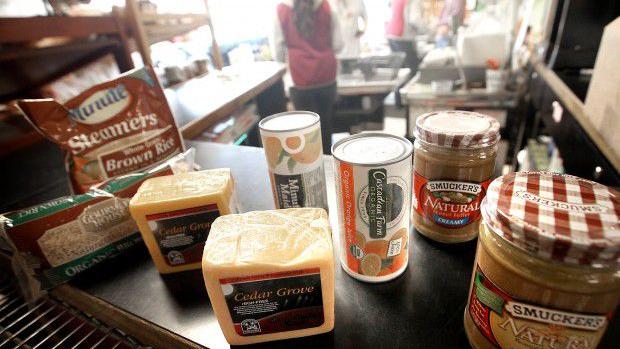
Lawmakers this week will take up measures aimed at promoting healthier eating among Wisconsin residents using food stamps and putting new limits on what kind of food can be purchased using the taxpayer-funded assistance.
A committee of lawmakers in the state Assembly on Tuesday will hold a public hearing on two bills: one that provides discounts on fresh produce and other healthy foods for recipients of the federal Supplemental Nutrition Assistance Program, which is known as FoodShare in Wisconsin, and another bill that would put new restrictions on what kind of items can be purchased with food stamps.
The hearing on the two bills is likely to renew a debate over whether the state should be seeking to control further what kind of groceries welfare recipients can purchase -- an effort that has failed in the state Legislature more than once in recent years and would require permission from the federal government.
A 50 percent discount would be applied to fresh produce for FoodShare recipients under a bill proposed by Rep. Mike Rohrkaste, R-Neenah, and Sen. Sheila Harsdorf, R-River Falls, which creates a pilot program that gives the discount to 2,000 FoodShare recipients in rural and urban areas of the state and "various discounts" on other healthy food options.
"Because we know what we consume affects our health, we focus on eating more fruits and vegetables and we encourage our children to do so as well. Unfortunately, those participating in FoodShare may find it challenging to access fresh fruits and vegetables," Rohrkaste wrote in an Aug. 30 memo seeking support from other lawmakers.
The Department of Health Services must seek proposals from groups to administer the pilot program through a state contract, which would include requiring the contractor to manage all financial transactions between and among the food stamp recipients, retailers, food manufacturers and the DHS, according to the bill's analysis by the Legislative Reference Bureau.
A fiscal estimate from the DHS shows a one-time cost for the proposed pilot program could be $700,000, which could not be absorbed into the department's budget and likely would not receive federal matching funds, DHS officials said in the analysis.
Rohrkaste said the idea came from a program started in Wisconsin in 2015 by UnitedHealthcare, which provides a card to the insured that is tied to digital coupons at participating stores. In that program, food companies reimburse food retailers.
"(Recipients) are eating healthier foods, but they're also making their benefits go farther," Rohrkaste said of the new proposal for FoodShare recipients. "For the same amount of money they're buying double the fruits and vegetables."
He said money also will be dedicated to studying whether recipients changed their food consumption behavior.
"It's a carrot program – literally – to encourage people to buy fruits and vegetables," he said, noting the health benefits to increasing consumption of non-processed food.
But Brandon Scholz, president of the Wisconsin Grocers Association, said his members oppose the "well-intentioned" proposal because, in part, previous efforts have not changed behavior and because the bill does not outline how retailers will be reimbursed for providing the discount.
"It doesn't work," Scholz said. "The people you are trying to convince to buy more cucumbers and radishes and lettuce and carrots and fruits and vegetables aren't necessarily in the mindset to eat healthier ... there's no incentive here. You're not getting anything but more broccoli."
Rohrkaste said the cost of the program to the state is supposed to largely go toward reimbursing the retailers.
Another bill proposed by Rep. Treig Pronschinske, R-Mondovi, and Sen. Duey Stroebel, R-Saukville, would create a pilot program to require participating FoodShare recipients to use their benefits to buy foods, food products and beverages "that have suffficient nutritional value."
Under the bill, the DHS must identify categories of groceries considered not to have sufficient nutritional value and prohibit FoodShare benefits from being used to buy them.
A spokesperson for Pronschinske did not respond to a request for an interview.
Similar proposals have failed in previous years under the weight of opposition from powerful business groups and federal rules that prohibit restricting purchases of "junk food" using food stamps.
This year's bill also has drawn the opposition from food business lobbying groups representing the beverage, beef, cheese, pork, cranberry, and potato and vegetable industries in Wisconsin.
Hunger Task Force, a supplier of food pantries, soup kitchens and homeless shelters with emergency food, also opposes the bill.
Sherrie Tussler, its executive director, said the bill "seeks to control what the poor can purchase after making broad assumptions about what they do purchase."
Tussler said directing the DHS to label foods as being sufficiently nutritional or not is a "rather weighty" undertaking that would require state officials to navigate lobbying from large food companies arguing their products or produce meet the proposed standard.
"Since the undertaking is ridiculous as a project, the sponsors of the legislation are wasting their time," she said.
A spokeswoman for the DHS did not immediately respond to a request for comment.
Rohrkaste said Pronschinske's bill is a different approach seeking the same goal his bill seeks.
"They both have good motives," he said.
Bagikan Berita Ini














0 Response to "Pair of bills aim to encourage, require food stamp recipients buy healthy food"
Post a Comment